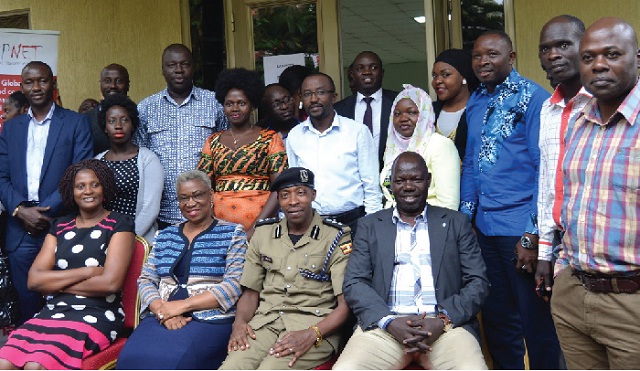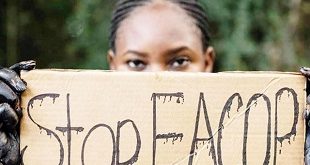
Activist points out key issues that require urgent action
Kampala, Uganda | THE INDEPENDENT | Human Rights Day is observed every year on December 10, the day the United Nations General Assembly adopted, in 1948, the Universal Declaration of Human Rights – a milestone document that proclaimed the inalienable rights which everyone is inherently entitled to as a human being regardless of race, colour, religion, sex, language, political or other opinion, national or social origin, property, birth or other status.
This year, the day was commemorated with a theme; ‘Our Rights, Our Freedoms, Always’ and Dr. Livingstone Sewanyana the Executive Director Foundation for Human Rights Initiative (FHRI) says this theme was chosen because they wanted to take Stock of the status of human rights in the country in addition to identifying areas of concern that require deliberate intervention of government.
“Ugandans are living on the edge. There is an apparent tension that is brewing and likely to manifest itself into political instability unless the situation is handled properly”, he told the Independent on Dec.06 attributing the tension to the debate around whether to or not to amend Article 102 (b) of the constitution to remove presidential age limits and Article 26 which government seeks to amend to allow it to compulsorily acquire land from its private owners for development projects even before compensating them. Discussing the two amendments hasn’t come easy with government showing little patience with people who present dissenting views to the extent that some have been clobbered, intimidated and others arrested.
The events before the bill proposing amendment of the presidential term limits was officially introduced in parliament where some legislators opposing the bill were clobbered to near death have particularly posed questions of how much regard the government has for upholding human rights in the country. Sewanyana says it’s because of this and many other human rights violations that happened throughout the year that defenders chose to on December 10 express discontent in what is taking place.
That week, in addition to editors of a daily tabloid – The Red Pepper being in detention for allegedly writing a false story about the government, two young artistes – David Mugema and Jonah Muwanguzi were detained for composing a song that utters offensive communication against the president.
Two weeks before that, suspects were re-arrested immediately after being granted bail and taken to a place that remains a mystery to date. These to Sewanyana are transgressions that threaten Uganda’s status as far as upholding human rights is concerned.
“The 13billion shillings given to MPs for consultations in the eyes of right thinking members of society is wasted expenditure”, he said of the money recently allocated to legislators when they were sent to consult their voters on the now popular age limit bill, “ It speaks volumes about the country’s priorities.
Celebrating International Human Rights Defenders Day at the Human Rights House with Physicals! @HurinetU @EHAHRDP @NCHRD_UG @actvuganda @LaspnetUganda @chapter4uganda @ngoforum pic.twitter.com/UNQiMZ3HUx
— FHRI (@FHRI2) December 8, 2017
There has been a spate of strikes by teachers, medical workers, traders and prosecutors calling for their work conditions to be improved. Nothing has been done about it”, he says calling for debate to focus on succession rather than regime survival.
For him, investment should be in health, agriculture, education, creating jobs for the youth and ensuring that security is decisively dealt with such that the stability that the NRM government has been commended for can be restored. This he said they can do by investing more in law enforcement specifically in equipping officials with skills that enable them investigate and deal with crimes before they happen other than having a reactionary approach.
‘Reviewing problematic legislations’
When it comes to legislations, Sewanyana says there are those that tend to erode people’s liberties. He mentions the Public Order Management Act of 2013 saying section 8 which provides for notifying the police when people are to assemble has been misapplied and should be reviewed. “It has been read by the police to mean they must authorize a public assembly yet it means they should regulate, provide a conducive, secure environment for an assembly not to control”.
Now the law is being seen as one that stifles people’s right to assemble and contravenes Articles 20 (1) (2) and 29 (1) (d) of the Constitution of the Republic of Uganda for its provisions reverse a Constitutional Court ruling which repealed sections 32 (2) of the Police Act that granted the police powers to prohibit public assemblies and processions in the case of politician Muwanga Kivumbi versus the Attorney General.
Another law that has affected people’s freedom of expression is the Computer Misuse Act of 2011. It legalizes prosecuting people for what they write, even on their social media pages with the most recent popular case being that of the Makerere University based researcher Dr. Stella Nyanzi who up to date hasn’t been heard in court. This law according to the human rights activist is trying to smuggle back and undo the false news ruling where Justice Joseph Mulenga annulled the law against publication of false news following a constitutional appeal filed by then editor of Daily Monitor Charles Onyango Obbo and Reporter Andrew Mwenda Mujuni.
In the area of policies and respect for international instruments, the over 20 years spanning activist says while there has been a progressive refugee policy, there’s a big disconnect between theory and the practice. He says there has been kidnap and abductions of refugees a thing that calls for immediate action. “The worst thing for a refugee is abducting him and taking him back to his country where he is tortured or his security isn’t guaranteed.
 The Independent Uganda: You get the Truth we Pay the Price
The Independent Uganda: You get the Truth we Pay the Price



